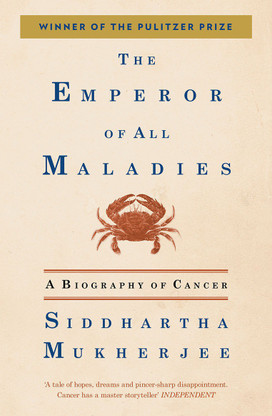


This is a remarkable book: cogently written, impressively researched, and animated by a sensibility that is at once skeptical and empathetic. (It did for me.) And Mukherjee’s elegant exposition of the science of cancer - which touches on retroviruses, proto-oncogenes, tumor suppressors, genetic mutations, biochemical pathways, and more - will prove challenging for readers without a decent background in biology. The vividly depicted suffering of patients such as Carla Reed, in the grip of an aggressive leukemia, or Barbara Bradfield, battling metastatic breast cancer, might evoke painful associations. Anchoring the narrative, and giving it a human face, are case studies of patients who lived to tell their tales - and of others who did not.īy dint of its subject matter, The Emperor of All Maladies can at times be difficult to read. (The “biography” conceit of the subtitle is clever without being particularly illuminating.) The Emperor of All Maladies tracks the first historical glimpses of the disease, the development of treatment regimens, the role of prevention, and the biological mechanisms by which cancer wreaks its various forms of havoc.

He ended up producing something considerably more ambitious: an eloquent and indispensable history of cancer.

Mukherjee, an assistant professor of medicine at Columbia and a staff physician at Columbia University Medical Center, writes that he originally intended the book to be a journal of his two years as an oncology fellow at Massachusetts General Hospital in Boston. It was with this dismal personal history as context that I picked up Siddhartha Mukherjee’s much-praised The Emperor of All Maladies: A Biography of Cancer. About nine months after her diagnosis, just after we had decided to enroll her in a hospice program, she asked me, heartbreakingly: “Julia, when do we go to the doctor?” A week later, she was dead. Her faith in modern cancer medicine was as profound as it was misplaced. She persisted in believing that she might somehow be cured, despite having been told that a cure was impossible. “I want to live,” she told the oncologist. My mother, in her early 80s, was both valiant and hopeful about her treatment. She was nevertheless offered chemotherapy, which might have retarded the progress of her cancer there is no way of knowing for sure. In my case, the litany of loss includes a grandmother killed by colon cancer, a longtime friend who succumbed to metastatic breast cancer, and a mother who survived breast cancer in her 60s but died, two years ago, of stomach cancer.īy the time it was diagnosed, my mother’s disease was advanced, metastatic, and therefore inevitably fatal. It is difficult, if not impossible, to reach middle age without experiencing at close hand the ravages of cancer.


 0 kommentar(er)
0 kommentar(er)
